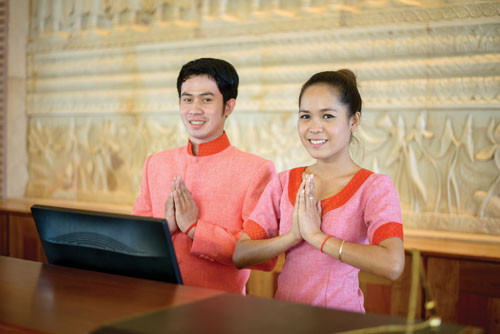Upcoming vocational facilities are much needed for the country to supply sufficient trained professionals and support the growing tourism industry.
The Cambodian government is now taking serious steps to address the country’s dearth of skilled tourism workers, raising hopes that manpower and service standards gaps that long afflicted the industry could finally be plugged.
 The country currently suffers a shortfall of about 200,000 trained tourism employees, with only 2,000 certified professionals graduating each year. If Cambodia is to hit its target of attracting seven million tourists annually by 2020, officials estimate it will need almost 10 million hospitality workers.
The country currently suffers a shortfall of about 200,000 trained tourism employees, with only 2,000 certified professionals graduating each year. If Cambodia is to hit its target of attracting seven million tourists annually by 2020, officials estimate it will need almost 10 million hospitality workers.
The Ministry of Tourism (MOT) has unveiled plans to build two vocational training facilities – one in Phnom Penh catering for 1,000 students, and the second training 300 students in the coastal town of Sihanoukville.
Both are slated for completion by end-2018, with enrolment starting in 2019. The centres will focus on training students to work at travel agencies and as tour guides and hotel service specialists – areas where the country falls behind regional rivals.
Luu Meng, restaurateur, hotelier and co-chairman of the Government-Private Sector Working Group on Tourism, believes training centres are essential to drive the industry forward.
He said: “Cambodia lacks a lot of the skills needed to meet tourists’ demands. We need more investment in proper training, and there are a lot of job opportunities in the tourism market that need filling.”
And with tourism still growing at a rapid rate and new hotels mushrooming across the country, Chin Meanking, restaurant owner and CEO of Cambodian Experiences, finds existing training efforts inadequate.
“The industry is growing by the day,” he said. “Specialised schools that are professional and deliver high-quality training in all areas are essential.”
Furthermore, training centres are necessary in producing high-quality employees – including at all levels of management – to make Cambodia self-sufficient and bolster the local workforce, said Chin.
“A big problem is finding qualified local staff to fill senior positions, like hotel manager at a five-star property or restaurant,” he said. “If we can’t find them locally, then we have to look abroad and this is not good for growing Cambodia’s human resources. These training centres are urgently needed.”
While there are several hospitality training centres led by NGOs operating across Cambodia – e.g. Friends International’s Mith Samlanh in Phnom Penh, and Sala Baï Hotel and Restaurant School in Siem Reap – these tend to focus on service staff such as waiters, chefs and hotel workers, rather than tour guides and operators.
Many hotels and restaurants also run their own in-house training programmes to plug the professional gap. Late last year, Cambodian hotel group, Sokha, launched its Sokha Culinary Graduates Programme for its staff.
The current lack of training facilities across the country means Exo Travel has to source its own employees and organise annual training. This includes Exo management training for department managers and supervisors, and Exo Academy for all staff. It also trains 150 independent guides each year.
Pierre-Andre Romano, Exo Cambodia’s general manager, said: “Education is a major value with Exo culture, so we have to compensate internally for what we cannot find in schools and universities here.”
Meanwhile, Cambodia’s largely unregulated service standards system is expected to get a leg up when the MOT introduces a rating scheme for recreational venues targeting tourists.
Developed to boost the quality of tourism goods and services, the coming months will see inspectors visit sights across the country, awarding restaurants that pass up to five stars; venues such as nightclubs, bars and karaoke joints of up to three orchids; while event venues, including conference halls, will receive a certification of recognition from the ministry.
According to the latest MOT figures, as of end-2016 there were 647 hotels, 1,996 guesthouses, 1,844 restaurants, 588 tourist agencies and 5,088 guides registered with the Ministry of Commerce and Cambodia Hotel Association.
However, Prum Veasna, general manager of Golden Tours, claims there are many more operating outside the realms of the law. “Those which do not pay taxes (or) comply with laws can bring down the industry for the rest of the hard workers. We need proper regulations and standards, and for them to be enforced.”
While the industry welcomes the move for its potential to eradicate “rogue operators” and elevate tourism standards countrywide, it is felt that tighter regulations need to be implemented across the board to create a level playing field.
“There are several major issues that need addressing,” said Romano, citing agents working without a Cambodian tourism license and foreign agents operating directly within the country, bringing their own operations staff, guides and bus groups, as common examples.
Last year, the MOT introduced minimum standards to the MICE industry and rolled out plans for capacity building.
“This is a good starting point,” said Romano. “But we need more for leisure. That is an important market.
This article was first published in TTG Asia June 2017 issue. To read more, please view our digital edition or click here to subscribe.




















